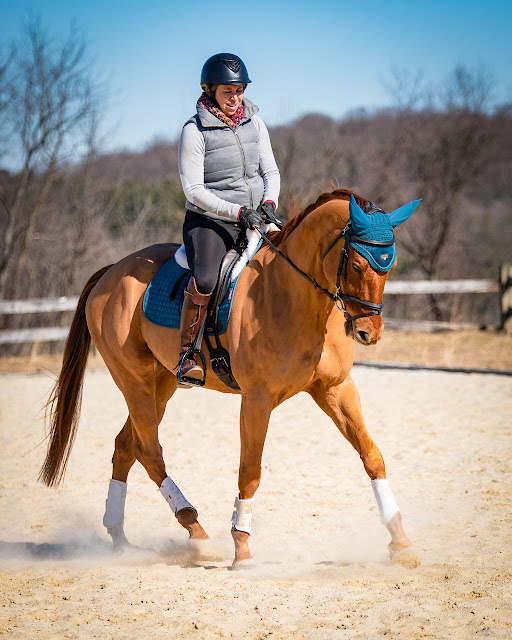Guest Blogger: Shortening Manes With Katie
If you know anything about me in my horsey life, you know I am a
type AAA when it comes to two things: ground manners and proper
turnout.** I am the old school sort who believes heavily in white
saddle pads and has only recently accepted the thrill of colored
breeches.
So what is a stickler like myself to do when I am dealing with a horse that genuinely doesn't like having its mane pulled? I believe most, if not all horses can be acclimated to clippers, but I truly believe there are horses out there with more sensitive crests. I don't want to hurt the horse or fight them over a haircut, but I also don't want it to look like I'm riding a broodmare.
So what is a stickler like myself to do when I am dealing with a horse that genuinely doesn't like having its mane pulled? I believe most, if not all horses can be acclimated to clippers, but I truly believe there are horses out there with more sensitive crests. I don't want to hurt the horse or fight them over a haircut, but I also don't want it to look like I'm riding a broodmare.
The solution: thinning the mane with scissors. A
poorly cut mane looks... well, it looks like a poorly cut mane. A well
cut mane should look essentially like a pulled mane. The process is
very similar to pulling a mane, and if you don't know how to pull a
mane, you should definitely learn that first. Go through the mane and
tease out the longer, lower sections, just as if you were pulling a
mane. When you start, you can start with thicker sections than you
would pull, but don't go too crazy with thickness. Next, hold the
section with one hand and use the other to cut straight up into the
section, starting where you would like the end of the mane to fall and
cutting a sharp angle up to the crest (or close to it, depending on
length).
Keep working as if you were pulling. I like to do the
mane in two halfs; I use the first to establish a general length and
thickness, and then then second half I just match the first. As with
pulling a mane, be conservative - you can always cut more off. You can
see in the second to last photo her mane is short but there is a thick
area. I went through and pulled maybe 10% and cut maybe another 10%.
If your horse doesn't have a very thick mane, you will want to go
through perhaps only once with the above technique, and then you will
want to follow same process but change the angle of your scissors so it
is closer to 45 degrees than 90.
Her mane tends to fly on both sides of her neck, even
when it is weighed down by the length. If I were taking her out in
public, I would make sure it is cut at least a week out and then damp
braid it over. In general, pull or cut at least 1-2 weeks before your
public debut. Once you have your process set, it is helpful to do a
little pulling or cutting every week so that nothing gets too out of
hand. Many horses that can stand 5 minutes of pulling can't even come
close to tolerating the hour plus required for a "big" mane pulling
session.
One last thing on either pulling or cutting: it takes time. A lot of it (this took about 1.5 hours, give or take). Set your horse up for success - make sure they've had a chance to drink some water and munch on some hay recently, make sure they've got plenty of fly spray, and don't do it during feeding time!
One last thing on either pulling or cutting: it takes time. A lot of it (this took about 1.5 hours, give or take). Set your horse up for success - make sure they've had a chance to drink some water and munch on some hay recently, make sure they've got plenty of fly spray, and don't do it during feeding time!
 |
| Bridget Before. Unsightly! |
 |
| Teasing out a section of hair |
 |
| Cutting with scissors pointed up |
 |
| Halfway there! |
 |
| Shorter, but still too thick. |
 |
| DONE! |


Good info! My horse's mane is hard to keep looking right.
ReplyDelete